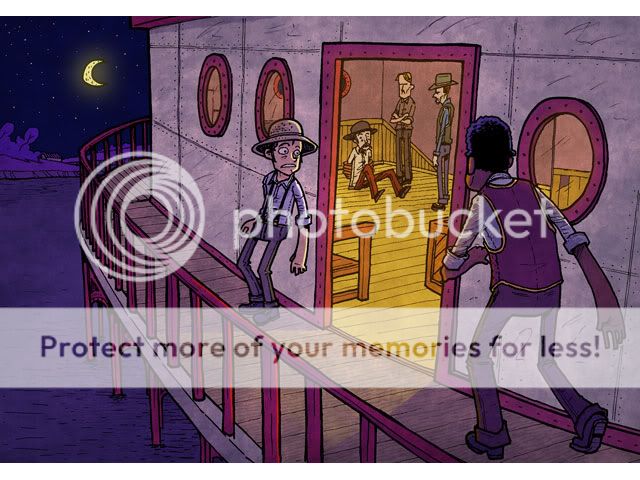* New Ignatz books at long last!
* This month, Partyka’s Guest Artist is…Partyka’s Matt Wiegle, who in addition to daily sketches is posting his sumptuous illustrations for Barnes & Noble’s Sparknotes series. This one’s from Huckleberry Finn.
* “Fired HEROES Writer-Producer Jeph Loeb To Run Marvel Entertainment’s TV Division!!” I’d say “‘Nuff said,” but at the link, AICN’s Hercules makes an interesting point regarding the relative creative roles of Loeb and Tim Kring on that show, too.
* Today on Robot 6: Octopus Pie‘s Meredith Gran proves it’s a different world than where you come from, yes it is now, yeah.
* Real Life Horror: An American torture conviction, of sorts.
* Forget the colorforms gimmick aspect: I’d take either half of the cover for Superman: The Man of Steel #30 as-is and be perfectly happy. Wouldn’t you?

* Matthew Cheney takes a long stroll through the glorious Rambo: First Blood Part II for The House Next Door. More on that to come…
I don’t have much of a use for Hot Topic, but I like that it exists.
This is because it democratizes punk by commodifying it. If you’re a thirteen year old from the suburbs, you don’t need to run the gauntlet of gate keepers to invest in a subculture; you just need to convince your mom to drop $20 on a t-shirt for you. Liberating!
Amen, except for the part about not having much use for Hot Topic–I started shopping there as an adult. (Via Nate Patrin.)
Without reaching to the Soviet bloc for examples, one case of such an artificial and untenable code is the American demand that all politicians be monogamous and drug-free. The press both creates this untenable expectation and exploits violations in order to entrench its power over the political system.
The demand that political journalists either not hold, or never express, their own political opinions is another such artificial and untenable code. Politically interested actors who attempt to enforce this code by revealing the private convictions of reporters do not have the moral goal of ensuring that political reporters have no political opinions; such a goal would be absurd. Rather, they aim to aggrandise their power over journalistic organisations by exacerbating the hypocrisy of those organisations’ official codes of conduct, and then exploiting evidence of that hypocrisy when useful.
A while back I realized why the press focuses so much on “hypocrisy,” and “flip-flopping.” In the “he said/he said” framework that the establishment media deems the only acceptable way to convey news, it’s verboten to discuss whether what either side “said” is factually accurate, let alone practically desirable, let alone morally sound. No, the only standard to which any political actor can be held is the standard he sets for himself. Thus, the gravest sin a politician can commit is “flip-flopping” from a previously articulated position, even if this is the result of a perfectly rational evolution of opinion rather than some craven cave-in to the prevailing political winds. In the eyes of the establishment press, you’re much better off holding and sticking with a completely odious position than you are ever changing your mind one way or the other. (Via Andrew Sullivan.)
* Which leads me to, of all things, the buried lede of this Carnival: Night Business/Gangsta Rap Posse‘s Benjamin Marra and No Trivia/Are You a Serious Comic Book Reader’s Brandon Sodeberg talk Rambo: First Blood Part II for The House Next Door as well. If you read Marra and watch the kinds of movies I do and care about the sort of movie action and violence I care about, you’ve probably already clicked over. But I want to talk about this line from Ben:
In comics, there’s a lot of evidence of devaluing entertainment and fun, especially within the current indie and underground spheres, instead focusing on a tone of pseudo-artistic seriousness and pretension.
Ben says this sort of thing all the time, like in every interview he does. And I eat up all of his comics and all of his interviews with a spoon. Yet at the same time, when I see bloggers say stuff like that, dismiss huge swathes of alternative comics by reducing them to an easily mocked stereotype, I pretty much flip out. What’s up? Well, here’s the part where I’d take a page from Tom Spurgeon and say it’s okay for an artist to say things we wouldn’t accept from a critic if those things are obviously said in service the sort of art they make. In terms of his personal satisfaction as a comics reader or his utility as a critic, I think he’s shooting himself in the foot by writing off alternative comics, but that’s not the issue. Po-faced trash is what gets Ben fired up as a creator, and he’s excellent at making it himself, so it’s hard to hold his biases against him.
But wait! I’ve done exactly that when I’ve seen other artists pull similar stunts–cf. my reaction every time Alan Moore lambastes Hollywood filmmaking in one breath while saying he doesn’t watch any of it with the next, or dismisses superhero comics as a creatively bankrupt regurgitation of other people’s ideas. What’s the difference? Well, it’s specific to Moore. Here’s a guy who’s made his career out of drawing sophisticated adult ideas from pop, pulp, trash, and kids’ stuff, whether we’re talking about Marvelman, Watchmen, Lost Girls, The League of Extraordinary Gentlemen, even From Hell to an extent. That makes it extra-frustrating when he dismisses today’s pop/pulp/trash out of hand, or acts as though he has a principled objection to working with other people’s ideas.
So what’s the difference between me saying this and people making fun of John Kerry? I like to think that in my case, first of all, the “hypocrisy” angle isn’t nearly as important as whether or not good or crap art is made as a result. I’d be perfectly happy to attack or defend Moore as an artist rather than as a person who did one thing but said another. Moreover, it’s not just the hypocrisy that rankles, it’s the fact that Alan Moore, of all people, oughta know better, right? We expect more from him because he’s displayed such a nuanced understanding of how much is really going on under the surface of storybooks and Victorian adventure novels and Captain Marvel knock-offs and Ripperology and on and on and on. So in the end the comparison with Marra’s oft-articulated viewpoint on literary comics isn’t even the right one to make–it’d be more apt if Marra was making Night Business while dismissing Rambo, not dismissing, I dunno, Asterios Polyp.
* Oh yeah: Benjamin Marra drew a picture of Sylvester Stallone in Cobra.




7 Responses to Carnival of souls